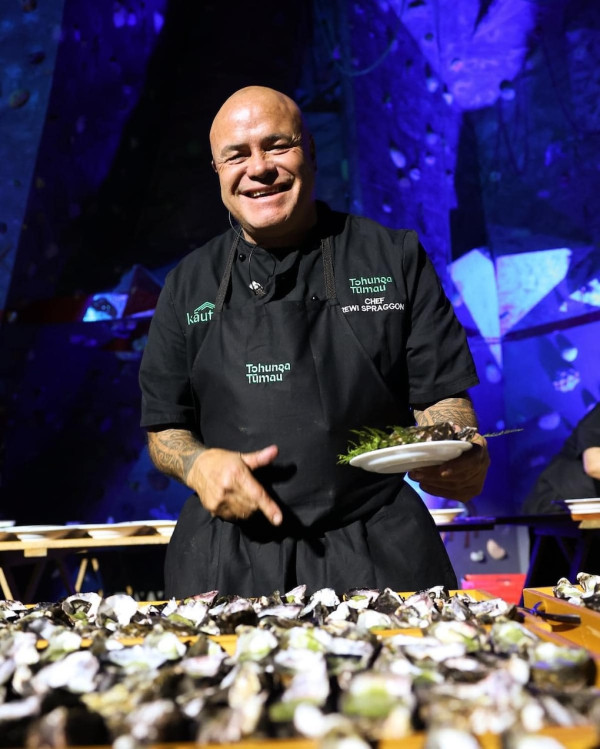It’s Matariki, the time of resetting the calendar and reflecting on those we’ve lost.
It’s also a time of coming together with whānau and friends.
Rewi Spraggon aka Hāngī Master has linked one of his recipes for people to try and make this year for Matariki.
Re: News journalist Te Ahipourewa Forbes spoke to Rewi (Te Kawerau ā Maki, Ngāti Hine) about feeding 640 people this Matariki and his favourite part about being a Māori chef.

Rewi Spraggon. Photo/supplied.
Te Ahipourewa: What does Matariki mean to you?
Rewi: Where I come from we celebrate Puanga [The star Puanga, known as Rigel in English, is celebrated by some iwi, because Matariki is not always visible from all parts of the country].
This time of the year is about setting the calendar for the Māori New Year and our maramataka Māori.
It’s important for us in our hapū that we change our calendar to the Māori one rather than the Pākehā one.
Te Ahipourewa: This year’s theme is Matariki Heri Kai - The Feast of Matariki, how are you incorporating kai into your Matariki celebrations?
Rewi: We ‘heri kai’ all the time, for us gathering people with kai is important.
We’ll be feeding 640 people here in Taupō using produce sourced by Māori suppliers. This means everything like the kina, pāua, and crayfish. This is the fourth year we’ve done this and it’s to celebrate all the Māori producers and the excellence of Māori kai.
At this event, we pull together the best of our produce and the best of our chefs and put on a hākari [feast] that is second to none for us.
We’ve also got young up-and-coming chefs, rangatahi, who are working alongside us over the next few days.
They get to work alongside legends like Peter Gordon and Karena and Kasey [Bird].
We wanted to have this kai to acknowledge the ringawera [kitchen hands] because the ringawera are always the last people to be thanked on the marae, if they even get thanked. They run the marae, they are the engine of the marae.
That’s the importance of this dinner. Doing it in a contemporary but traditional way too.

Rewi Spraggon. Photo/supplied.
Te Ahipourewa: What do you think about organisations, businesses or restaurants that try to monetise Matariki and try to make a profit off the celebrations?
Rewi: It’s the wrong reason for it.
For us [Māori] it’s about resetting the calendar and reflecting on those we’ve lost in the past year.
I encourage people to celebrate.
I’m in a position now where I’ve turned away 70 jobs because everyone wants a hāngī.
Corporate businesses say, “Oh we want to celebrate Matariki, so we’re gonna hire you”, but it should be celebrated daily.
It shouldn't just be Matariki, Waitangi Day or Māori Language Week, it should be every day.
Schools are getting right into it which is cool, they’re learning properly but when it comes to big corporate business, I don't favour that.
Te Ahipourewa: What is your favourite part about being a Māori chef?
Rewi: Coming together with other Māori chefs, we’ve got a really tight network that has grown.
We talk to each other about sourcing different ingredients.
Having that network means we can support each other.
It’s a hard industry to get into and it doesn't pay well until you really crack it.
Te Ahipourewa: What’s the hardest part about catering for so many people?
Rewi: It’s all about systems and making sure the food gets out hot, you want all 640 people to experience the same dish.
It’s years of experience between us all even down to the front-of-house staff delivering the kai to the tables.
It’s a cool challenge.
Te Ahipourewa: How has preparing and making kai for others changed you?
Rewi: I was raised on the marae, my mum was the head of the kitchen there. It’s changed for the better, we have better systems now.
By doing it all the time you get better.
Te Ahipourewa: What is a recipe you suggest people could try making this Matariki?
The Hāngī Master's Watercress & Mussel Toroi
Ingredients
- Salt - 1/4 cup
- Containers of classic marinated mussels (or 750g fresh if you’ve got them) - 2
- Watercress, roughly chopped - 400g
- Whole chillies, roughly chopped - 2
- Garlic cloves, roughly chopped - 4
- 1L preserving jars - 2
Method
- In a large pot, bring 2 litres of water and salt to boil.
- Add the mussels and let them simmer for 1 minute.
- Remove the mussels and place onto a chopping board. Cut the mussels into halves and set aside.
- While the pot of water continues to boil, add the chopped watercress and boil for another 5 minutes. Remove the wilted watercress and set aside.
- Put watercress and mussels into a clean preserving jar in even amounts.
- Add chopped chilli and garlic into the jar and mix.
- Using the remaining liquid from the pot, pour slowly into the jar until full. We recommend using a knife to push content down to help release bubbles and pressure.
- After screwing the lid on tightly. Store in the pantry until it’s ready to serve. Once opened, keep in the fridge for up to 5 days.
More stories:
Five ways to embrace Matariki
This year, the Matariki public holiday falls on July 14.
Maramataka: What if our big holiday break was in winter, not summer
The maramataka is the traditional Māori lunar calendar.
Teaching urban Māori lost skills of how to gather kaimoana safely
“It's scary because the rate in which Māori men are drowning continues to increase.”